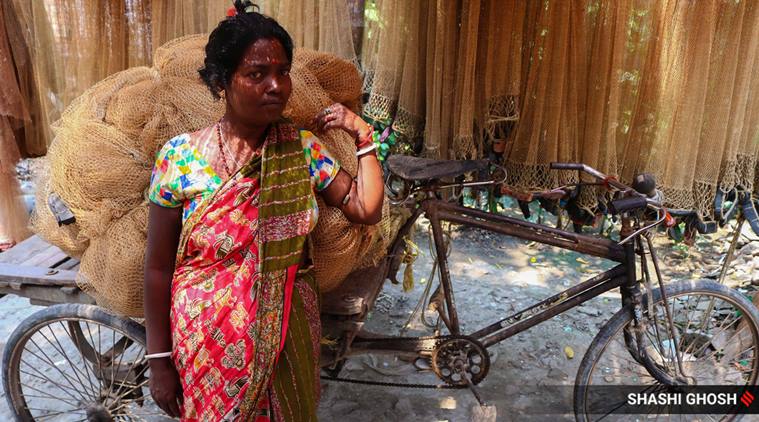 Tara Mondal was asked by all the houses where she worked as a maid not to come even before lockdown was announced.(Express photo by Shashi Ghosh)
Tara Mondal was asked by all the houses where she worked as a maid not to come even before lockdown was announced.(Express photo by Shashi Ghosh)
Written by Shashi Ghosh, Edited by Shreya Das
In a bid to flatten the curve and stop the spread of coronavirus, around the world if there is one measure being adopted by all, it’s social distancing. However, for people residing at slums — cramped together in shanties, there is anything but space. Indian Express photographer Shashi Ghosh visited one such slum located in Barasat’s Kazipara in West Bengal and saw how daily wagers and their family members are struggling to survive.
Moving past the busy intersection of Taki Road and Jessore Road, walking down the alleys of Kazipara, most residents near the main road have no idea that near the Puipukur, Khudiram Pally, there is a slum called the Jelepara (fishermen colony) that houses nearly 470 families. Most of the people here are involved in fishing, or work as manual labourers, masons or take up whatever work is available. These unskilled workers have been finding it way too difficult to sustain with no saving to fall back on, and almost no scope to earn daily.
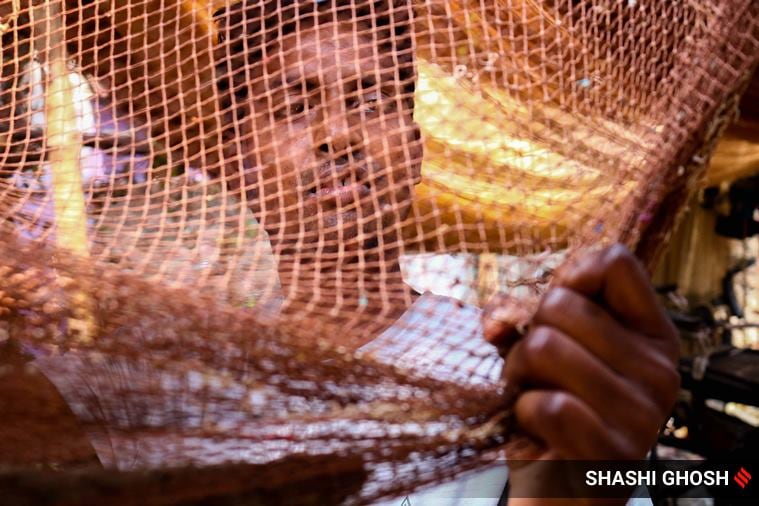 Most of the people living in the slum are fishermen, who don’t know when they can go back to fishing regularly to have a source of income again. (Express photo by Shashi Ghosh)
Most of the people living in the slum are fishermen, who don’t know when they can go back to fishing regularly to have a source of income again. (Express photo by Shashi Ghosh)
As most can’t go out amid the pandemic to nearby bheris in Barshirhat and local ponds to cast their net for fresh catch, their income has dried up. With lines of trawl nets resting on bamboos around the slum, most sit idle just gazing at it all day, just maybe dipping it in water to avoid it being worn out and fix any repairs.
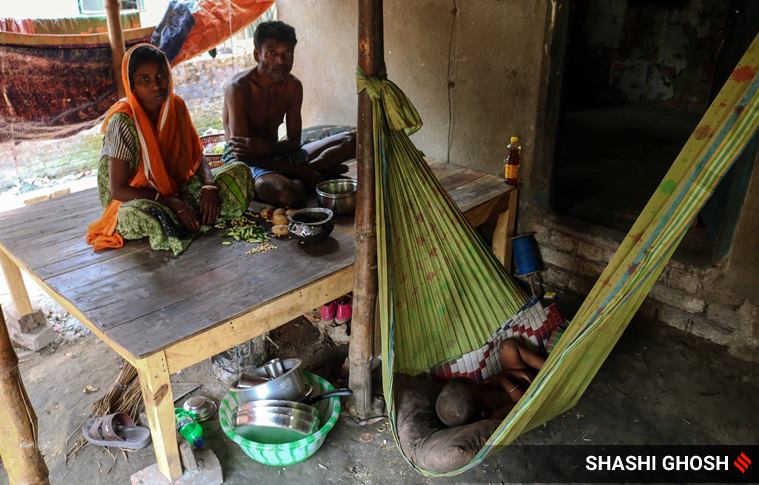 Cramped in small huts, with many family members, most cook outside in the open — a courtyard shared by many slum dwellers. (Express photo Shashi Ghosh)
Cramped in small huts, with many family members, most cook outside in the open — a courtyard shared by many slum dwellers. (Express photo Shashi Ghosh)
The WB government had announced it would distribute free rice and wheat to people till September, benefitting 7.5 crore people amid the novel coronavirus (COVID-19) pandemic. However, people in the slums were not even aware of the relief measure. The CM had also said Rs 1,000 will be given to people working in the unorganised sector to help them in these trying times, but no such announcement reached these slum-dwellers.
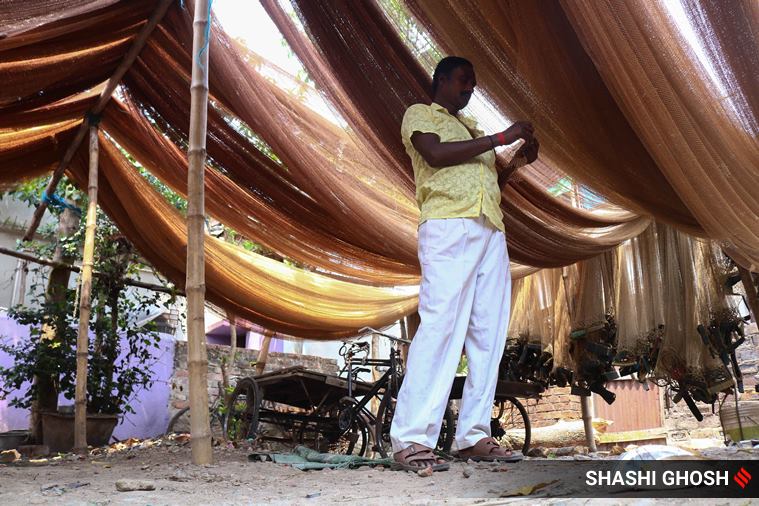 The WB government had announced many measures to help the poor in the state, however, most residing in the slum said they were unaware about the initiatives. (Express photo by Shashi Ghosh)
The WB government had announced many measures to help the poor in the state, however, most residing in the slum said they were unaware about the initiatives. (Express photo by Shashi Ghosh)
When asked why no one is donning masks or Not practising social distancing, sitting cramped together, most laughed. For 45-year-old Shankar Mondal, it’s a luxury to sit at home. “This is our home, we don’t even have a proper roof. Six of us live here, there is no kitchen, so all the families here cook in the common courtyard, people are saying not to go out but stay here and maintain distance, that can’t happen here.”
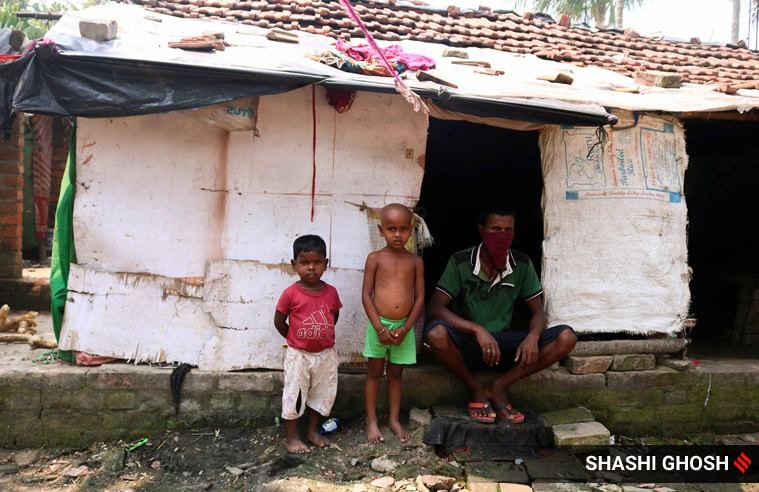 Staying at home is a luxury for most residing here. Most of them were spotted roaming around in the area without masks or taking any precautionary measures amid the pandemic. (Express photo by Shashi Ghosh)
Staying at home is a luxury for most residing here. Most of them were spotted roaming around in the area without masks or taking any precautionary measures amid the pandemic. (Express photo by Shashi Ghosh)
On being asked if they know about washing hands at regular intervals as prevention, 36-year-old Pratima Midha said, “We only get water from a specific time, there is enough line to get water already, we can’t waste water. Here, we have to ration water too, you know, to drink, to cook.”
For 40-year-old Tara Mondal, who used to work as a maid in the nearby localities, most of the houses she used to work asked her not to come. “They fear that we live in a slum and then visit six or seven houses, going to their house might spread the infection. So, I have no option but to sit home with no idea, if my job is still there or not, not to mention, I don’t have enough money to buy supplies.”
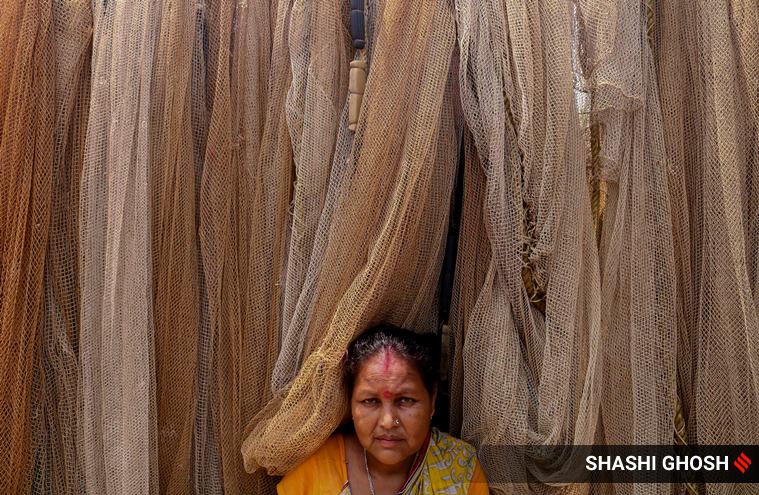 With the little supplies they have managed to get, sharing it among many family members is tough, so most adults are prioritising kids first in every meal. (Express photo by Shashi Ghosh)
With the little supplies they have managed to get, sharing it among many family members is tough, so most adults are prioritising kids first in every meal. (Express photo by Shashi Ghosh)
Few local youths have volunteered to bring some supplies from local stores and rations shops, but it is hard to survive on that.
Zubeda Biwi (76), who no longer can work and lives with her big family of six members in a thatched hut, says, they are somehow managing by eating once-a-day. “We got 1 kg rice, 1 kg daal, tell me how long can we survive on that supply with so many mouths to feed. There are children, we feed them first, then we elders eat whatever is left,” the elderly woman lamented, saying she almost had nothing to eat for a week before the supplies were handed out.
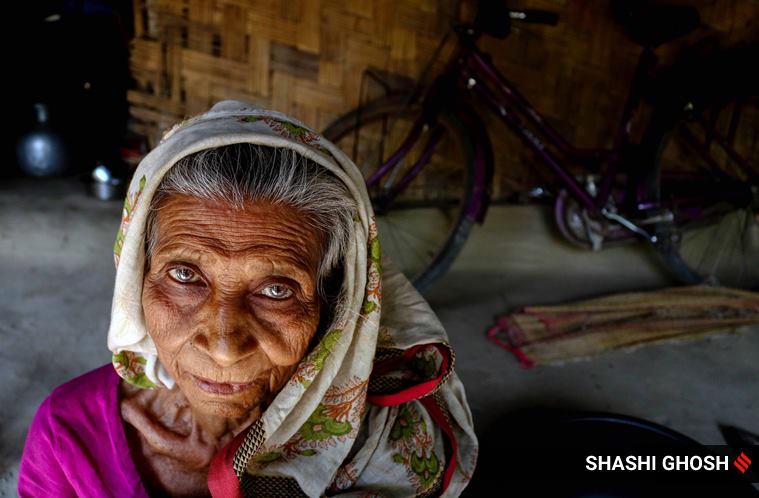 For elders living in the slum, they are not scared about being vulnerable to the infection but are worried might not have food for long. (Express photo by Shashi Ghosh)
For elders living in the slum, they are not scared about being vulnerable to the infection but are worried might not have food for long. (Express photo by Shashi Ghosh)
Most don’t have a ration card in this locality and are not sure if they can avail any of the schemes to get free ration announced by the state. For others, their only breadwinner is stuck in some distant land and couldn’t come back in time with money.
Lakshmi Parui’s son is somewhere in Maharashtra, a place she doesn’t know. “He wanted to come back for me but said there is no bus or train. We spoke once on the phone, but there is no way he can send in some money for me to buy essentials,” says the 66-year-old. However, thanks to her neighbours, Parui did receive some rice and dal to cook something and sustain.
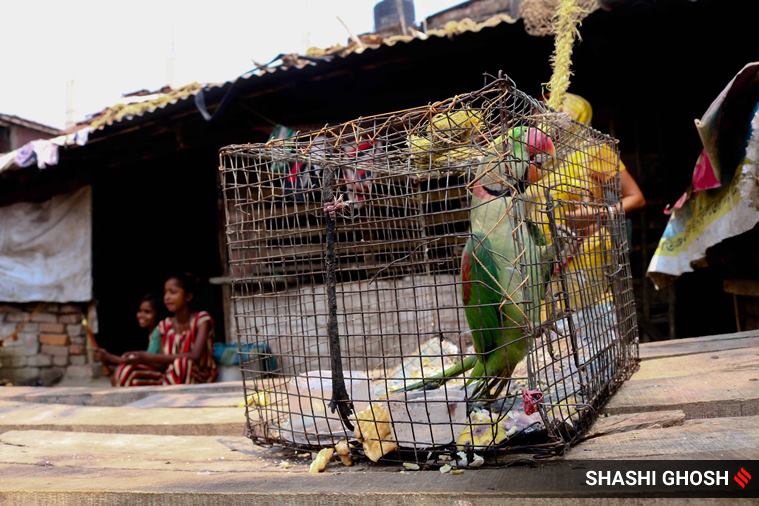 With many breadwinners stuck at different state, even though they have money, there is no way to send it back to their families. (Express photo by Shashi Ghosh)
With many breadwinners stuck at different state, even though they have money, there is no way to send it back to their families. (Express photo by Shashi Ghosh)
The lack of a job or money is not their only worry. Many in the slum are addicts and have been unruly in recent days. There have also been rumours, a few had visited Delhi a few weeks ago and attended the Nizamuddin Markaz, but no one is sure where they are now and there are fears among many they might get the infection as they haven’t been able to take any precautionary measures.